By Jaqueta Abbey
 In early June Inspired Teaching hosted a “Parenting Resilient Children” workshop that shifted our innovative, tried-and-true approach from the classroom to home. We explored how parents can foster fun and creative experiences while allowing their children the room to find solutions to their own problems.
In early June Inspired Teaching hosted a “Parenting Resilient Children” workshop that shifted our innovative, tried-and-true approach from the classroom to home. We explored how parents can foster fun and creative experiences while allowing their children the room to find solutions to their own problems.
After a crash course in Inspired Teaching’s five core elements (Mutual Respect, Student As Expert; Purpose, Persistence, and Action; Joy; and Wide-ranging Evidence of Student Learning), we engaged in an activity that encompasses all of them: Learning Content Through Interests.
In this activity, we asked parents to think of an interest their child has. One parent shared that their child enjoyed picking up trash. We then crowdsourced some questions that could be asked to encourage the child to share their expertise about the topic or encourage them to learn more. Example questions included things like: Whose responsibility is it to pick up the trash? Where do you think trash goes after you throw it away? What makes something valuable to one person but makes another toss it out?

We also introduced the idea of asset-framing: shifting our perspective so that our impressions come from a place of strength. In the spirit of inquiry, each of us asked ourselves two questions about the past year: What have my aspirations been? What have my contributions been? After reflecting on the answers, we asked the same questions about our children: What have my child’s aspirations been? What contributions has my child made?
We begin with asset framing as a means of grounding ourselves in the good but in this workshop we also acknowledged that there are plenty of times when things are not good. Conflicts arise, challenges present themselves, what do we do then? At times like this, the ABCDEs of Learner Needs are a useful tool to identify which of your children’s needs aren’t being met and how you could meet them. One example we discussed was a child who didn’t want cereal for breakfast and acted out. We identified Autonomy as their unmet need and brainstormed solutions like offering a choice or having the child help create the grocery list.
At the end of the workshop, Aleta presented Inspired Teaching’s Resilient Summer Handbook. This guide contains resources and activities designed to bolster social and emotional well-being compiled from almost three decades of work Inspired Teaching has done with teachers and schools.
